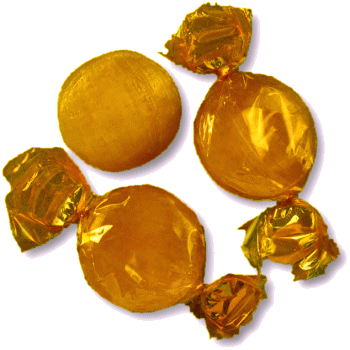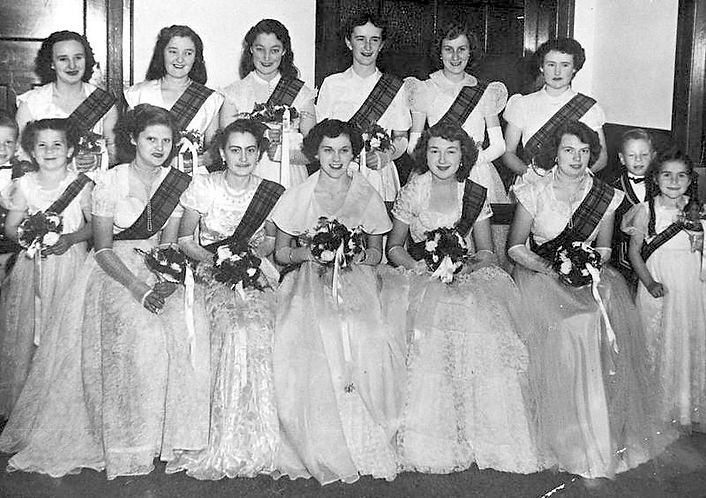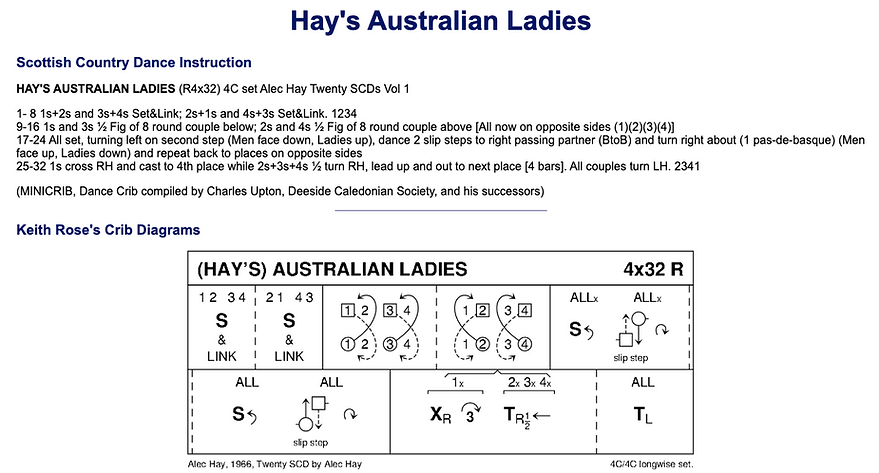




WELCOME TO AN ENTERTAINMENT SITE FOR SCOTTISH COUNTRY DANCERS!
Enjoy this curated selection of theme-related dances for celebrations and holidays, or find a dance associated with a special calendar day, or EVEN your own birthday!
Debutantes in Queensland, Australia, 1952
Jan 26

Australia Day
Hay's Australian Ladies
Other Scottish Country Dances for this Day
Today's Musings, History & Folklore
"G'day Australian ladies!"
Happy Australia Day to all Aussies and ex-pats on this official national day of Australia. The 26th of January marks the anniversary of the 1788 arrival of the First Fleet of British ships at Port Jackson, New South Wales, and the raising of the Flag of Great Britain at Sydney Cove by Governor Arthur Phillip.
Brought to life is a photo from the John Oxley Library, State Library of Queensland of debutantes holding bouquets at a social dance, 1952.
Scottish country dancing was a key feature in many Australian debutante and community balls in the 1950s, particularly in regions with strong Scottish heritage like Queensland’s South Coast\ an often included Highland dress, bagpipe music, and traditional reels and jigs!
This 32 bar reel by Alec Hay for 4 couples keeps all four couples busy for the entire dance and begins with all doing a set and link!
Your intrepid editor did a deep dive trying to find the origin of this lovely photograph and although not definitive, did find this article from the same year that describes 11 debutantes. And if not the one in question, it could be.
At any rate, enjoy this vintage description of days gone by from this Queensland newspaper:
The Toowoomba Chronicle and Darling Downs Gazette , Sat 16 Aug 1952
***
HIGHLAND BALL
The Memorial Hall, be-decked with Scottish emblems, presented a gala scene last night when the annual Highland Ball was held. Scottish pennants, colourful tartan ribbons, heather and thistles arranged amid a wealth of flowers and greenery comprised the decorative scheme for the main hall. The supper room was spectacularly decorated with window boxes overflowing with brightly shaded flowers, and colourful tartan ribbon streamers made a bright colour splash. The white-topped tables were set with flat bowls of seasonable flowers.
The invited guests included the Chief of the Toowoomba Caledonian Society (Mr. K. Macfarlane), Mrs. Macfarlane, the Deputy Premier (Mr. J. E. Duggan), Mr. R. W. Swartz, M.P., and Mrs. Swartz, Mr. G. W. Chalk, M.L.A., and Mrs. Chalk, Mr. E. R. Wood, M.L.A., and Mrs. Wood, Mr. G. R. Stephens, Chief of the Warwick Caledonian Society, Chief of the Brisbane Caledonian Society, Chief of the Stanthorpe Caledonian Society, and president of the Dalby Pipe Band (Mr. W. Napier) and Mrs. Napier.
Wearing lovely Old World style frocks of white offset with Royal Stewart tartan sashes, and carrying posies of pastel-shaded flowers, the eleven debutantes made a charming picture as each entered the ballroom under an archway of swords. Preceded by a miniature debutante and partner, they walked along a carpeted pathway to the dais where they were met by the Matrons of Honour, Mesdames R. Martin and A. Parmenter, who presented them to Mr. and Mrs. Macfarlane. After the presentation, the debutantes and their partners formed a circle and danced a tangoette, and then proceeded to the supper room.
The debutantes were Misses Lorna Steinmuller, Lillian Smith, Vida Smith, Lorna Hansen, Shirley Murphy, Joan Penman, Patricia Wallis, Ivy Brown, Betty Mulvena, Shirley Wilkie, and Evelyn Long.
You can read the entire article by following the link below. 🇦🇺 💙 🤍 ❤️ 💃 💃 💃 💃 💃 💃 💃 💃 💃 💃 💃 💐
Hay's Australian Ladies
Happy Australia Day to Australian ladies and all!
Most of the vocabulary of Australian English is shared with British English, though drawn from many sources, including various dialects of British English as well as Gaelic languages, some Indigenous Australian languages, and Polynesian languages. Australian slang has its own character and uniqueness!
One of the first dictionaries of Australian slang was Karl Lentzner's Dictionary of the Slang-English of Australia and of Some Mixed Languages in 1892.
Where British and American vocabulary differs, Australians sometimes favour a usage different from both varieties, as with footpath (for US sidewalk, UK pavement), capsicum (for US bell pepper, UK green/red pepper), or doona (for US comforter, UK duvet) from a trademarked brand. In other instances, it either shares a term with American English, as with truck (UK: lorry) or eggplant (UK: aubergine), or with British English, as with mobile phone (US: cell phone) or bonnet (US: hood).
Australian English is particularly divergent from other varieties with respect to geographical terminology, due to the country's unique geography. This is particularly true when comparing with British English, due to that country's dramatically different geography. British geographical terms not in common use in Australia include (Australian usage in parentheses):
coppice (cleared bushland); dell (valley); fen (swamp); heath (shrubland); meadow (grassy plain); moor (swampland); spinney (shrubland); stream (creek); woods (bush) and village (even the smallest settlements in Australia are called towns or stations).
In addition, a number of words in Australian English have different meanings from those ascribed in other varieties of English. Clothing-related examples are notable. Pants in Australian English follows American usage in reference to British English trousers but in British English refer to Australian English underpants; vest in Australian English pass also in American refers to British English waistcoat but in British English refers to Australian English singlet. Thong in both American and British English refers to underwear (known in Australia as a G-string), while in Australian English it refers to British and American English flip-flop (footwear).
There are numerous other examples, including biscuit which refers in Australian and British English to what in American English is cookie or cracker but to a savoury cake in American English!
And think twice before referring to ladies as "Sheilas", a well-known and antiquated slang Australian English term, dating from the 1830s! "Sheila" as a term for a woman is derived from the Irish girls' name Síle and a common given name in many English-speaking countries, reaching a peak of popularity in the 1960s! It has been variously spelled over time as as shaler, shelagh, sheeler, shellah, shela, and shelah. In Irish traditions, Sheelah is named as the wife of St Patrick, with St Patrick’s Day followed by Sheelah’s Day, a tradition which was maintained in Australia in colonial times.
Use of this as a term today as a generic may be considered with disfavor, so gauge your audience wisely!
For more on common expressions, click the regional slang map below.
And to see the dance performed by the Ochil Scottish Country Dancers, St Ninian's Church Hall, Stirling, Scotland, 2018, scroll down (music By Alan Ross).
And to read the article about the debutante Highland Ball, click here!
Click the dance cribs or description below to link to a printable version of the dance!




